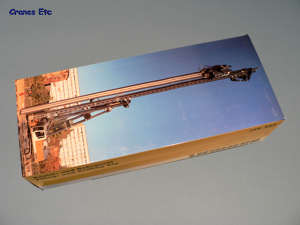 | | Colourful Liebherr picture box. |  | 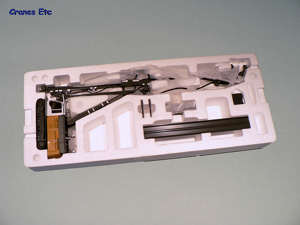 | | Much of the large box is in fact air but the leader dictates the size. | 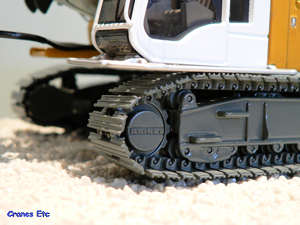 | | Detail on the track frames and pads is very good. | 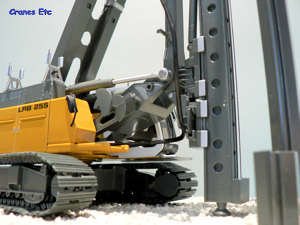 | | Complex mechanics support the leader - as well as the foot at the bottom! | 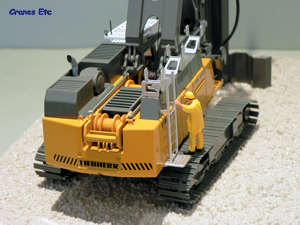 | | Rear detail. | 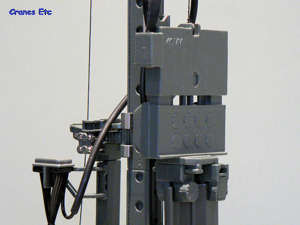 | | The vibrator is heavy. The pile clamps at the bottom are on slides. |  | | With care it is possible to have a raking leader. | 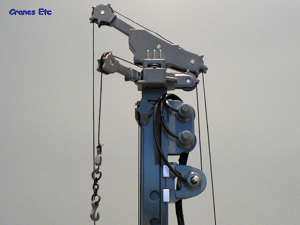 | | At the top of the leader, there is a working auxiliary winch and excellent detailing. |
| This model is one of a relatively small number representing foundation equipment. The Liebherr LRB 255 is an 80t machine with a maximum 30m leader length (the leader is the vertical 'rail' on which the piling equipment slides).
In the base configuration the model is equipped for driving sheet piles with a 40VM vibrator.
Packaging
As with all Liebherr models it comes in the standard picture box which is rather large as the leader is around 50cm long (and therefore scales at 25m), but it is not as heavy as you might expect. Inside, the model is held in two expanded polystyrene trays with the top section also containing a plastic base for the model to be displayed upon. The model is well wrapped and packed and there was no damage on the review model which is good considering some of the parts are delicate.
An instruction sheet is provided which is in German and English and has excellent photos. Helpfully the instructions are professional and pretty good. Out of the box there are relatively few separate pieces although it is refreshing to see spare pins supplied with the model as these are so easily lost.
Detail
There is no detail underneath the model, but this is made up for on the track frames. They have good detail and include working rollers. The drive sprockets are also good containing the name 'Liebherr' in the casting. The tracks are metal and are made up of fine and delicate links which are mounted on spring loaded sprockets so they keep a good tension.
Detailing on the body is generally excellent. The operator's cab has textured access platforms, a windscreen wiper and rear view mirror, and a fine metal grab rail. The roof has a plastic cab guard and is enhanced by small lights and an aerial. Inside the cab, detail is also good with shaped joysticks and pedals visible. Moving behind the cab the body panels are finely detailed with door handles and grilles.
At the rear of the body the Liebherr name is embossed in the casting of the counterweight. Moving around the body, there is a good metal access platform and ladder and another rear view mirror towards the front.
At roof level the model excels with excellent metal guides for the hoses which are used when the machine is transported. There is a very good exhaust system modelled and good grille structures. The leader and support structures are first rate. Nearly all the components are metal with the only exceptions being the hydraulic cylinder jackets and part of the supporting frame. Unusually some of the plastic cylinder jackets have moulded pipe work which is a nice touch.
The leader is dead straight and has circular castellations as per the original. At the base is a metal foot and at the top the winch details are top notch. The slides which allow the leader to be moved for transport and the universal slide for the piling vibrator are metal and work very well. The pulleys in the leader top appear to be metal. Various hoses complete the complex look of the model.
The vibrator tool is a very heavy solid piece and has two plastic pile clamps which is just as well so they do not scratch the paint off the supplied sheet piles. An unusual feature is the plastic base which comes with the model. It has grooves for inserting the model sheet piles so an effective display can be produced. The base also features a couple of pop out round holes for the separate accessory pack including auguring equipment.
Features
The tracks work well although are a little stiff due to the tension they are under. They are mounted on extendible frames so the tracks can be pulled out in operating mode and can be pushed in to narrow the width for transport purposes.
Within the body of the model three working winches are present although only one is used in sheet piling mode. Operating the winches is achieved by using a supplied key and access is gained through opening doors in the bodywork, one on the operator's cab side and two on the other side. Two of the winches work by pushing in on the key which disengages a brake and allows free rotation. These winches are spring loaded such that the brake is re-engaged when the key is withdrawn. They work really well and all model winches should be designed this way. The third winch is the more usual friction variety. At the top of the leader is another working auxiliary winch which has a small hook and chain attached.
All the sliding parts on the leader work well. To ensure the leader can be placed in a true vertical position In working mode there is a complex working slide mechanism which is an excellent piece of model engineering.
The vibrator can be mounted on the universal slide with or without having sheet piles attached. The pile clamps are removable from the vibrator and can also slide in order to enable the clamps to be fixed at the right position. Care has to be exercised if the vibrator is near the top of the leader as it makes the model somewhat top heavy due to the weight of the vibrator unit.
A particular feature is that the model can be displayed in working or transport configuration. The model makes a great transport load and it is only a pity that the footplates for the cab and access ladder do not fold in or detach for transportation. It would also have been superb if the counterweight at the rear had been removable as in the real machine.
Quality
The overall impression of this model is highly favourable. It is very detailed and the quality of the model engineering is very good. The use of plastic has been minimised and the castings leave no cause for complaint. Paintwork and graphics are also of a high standard.
Price
For what is offered the model is very good value.
Overall
It is pleasing to see more models of foundation equipment appearing as they tend to be particularly interesting and complex machines. NZG and Liebherr have produced a very good model. Collectors will be very pleased with it and there are hardly any gripes at all. The quality of the engineering and manufacture sets a high standard and the future provision of an accessory pack will enhance the model further. As an item to display it looks really good on a low loader or standing on the base driving sheet piles.
Footnotes
The model first appeared at the BAUMA Equipment Exhibition in April 2007. It first appeared at retailers in June 2007. An accessory kit includes auger attachments. The model was released in the colours of Soletanche Bachy at the end of 2012.
|
| |
| 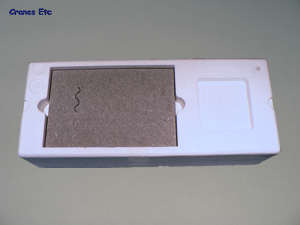 | | The display base packed in the box. | 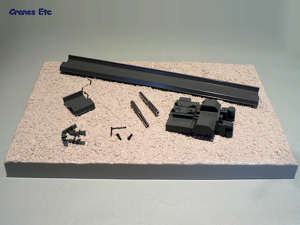 | | Pieces out of the box. The vibrator and two sections of sheet piling. Two winch handles, pins and spare track pads are included. | 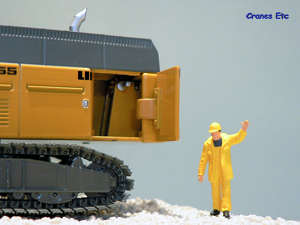 | | An opening door gives access to the rear winch even though it is not used in sheet piling configuration. | 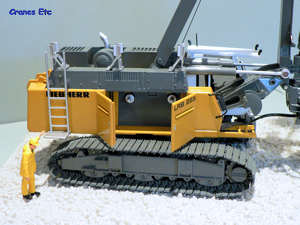 | | Doors open to give access to the main winches. | 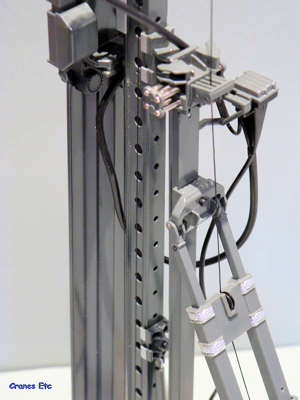 | | Complex engineering of the leader support. | 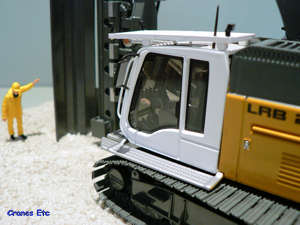 | | Impressive cab details. | 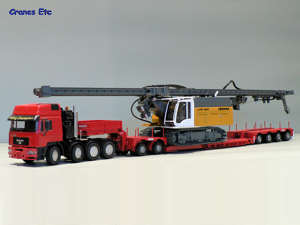 | | It makes a very good low loader load. | 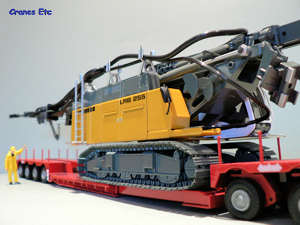 | | All on board and ready to go. |
|

